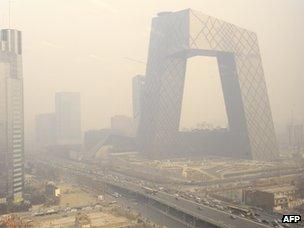China warns foreign embassies not to monitor pollution
- Published

Chinese cities like Beijing often have poor air quality
Foreign embassies in China should refrain from publishing their own independent air pollution readings, a senior Chinese official has warned.
The deputy environment minister's comments appeared aimed at the US embassy, which puts out its own figures on high pollution levels in Beijing.
The US embassy has a monitoring station on its roof and publishes the results hourly on the internet.
Air quality in Beijing and other cities is notoriously poor.
Without mentioning the US, Wu Xiaoqing, deputy minister of Environmental Protection told a press briefing in Beijing that only the Chinese government is authorised to publish air pollution data.
In reply to a question, Mr Wu said that "some foreign embassies and consulates in China are monitoring air quality and publishing the results themselves".
He said that this contravened the Vienna Convention on Diplomatic Relations and the Vienna Convention on Consular Relations.
"It is also against relevant environmental protection regulations," he said.
But many residents have questioned the accuracy of official government figures, which until this year did not include the most damaging particles.
<link> <caption>The US says</caption> <url href="http://beijing.usembassy-china.org.cn/070109air.html" platform="highweb"/> </link> its own equipment should not be wholly relied on, as its data is compiled from only a single monitor. Its website makes clear that the measurements are for the benefit of embassy personnel and do not give citywide data.
The US monitoring helped spur a public outcry earlier this year that forced China to update its own standards, according to the BBC's Damian Grammaticas.
China has privately demanded that the US halt its readings in the past, but this is believed to be the first time it has delivered a public warning over the issue, he adds.
Using a device on its rooftop, the US embassy in Beijing releases the information hourly via Twitter. US consulates in <link> <caption>Shanghai</caption> <url href="http://shanghai.usembassy-china.org.cn/airmonitor.html" platform="highweb"/> </link> and <link> <caption>Guangzhou</caption> <url href="http://guangzhou.usembassy-china.org.cn/guangzhou-air-quality-monitor.html" platform="highweb"/> </link> do the same.
- Published16 May 2012
- Published2 March 2012
- Published23 January 2012
- Published21 January 2012
- Published6 December 2011